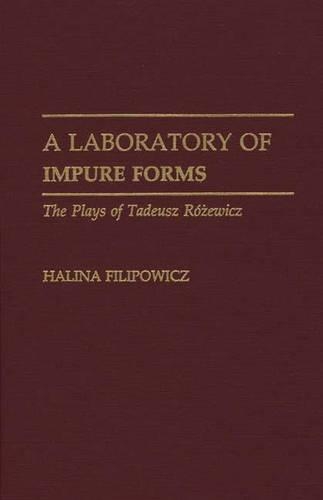
A Laboratory of Impure Forms: The Plays of Tadeusz Rozewicz
(Hardback)
Publishing Details
A Laboratory of Impure Forms: The Plays of Tadeusz Rozewicz
By (Author) Halina Filipowicz
Bloomsbury Publishing PLC
Praeger Publishers Inc
4th April 1991
United States
Classifications
Tertiary Education
Non Fiction
891.8527
Physical Properties
Hardback
192
Description
This is the first comprehensive examination of the works of contemporary Polish playwright Tadeusz Rozewicz. Halina Filipowicz applies a theoretical perspective to more than a dozen plays and situates the important postwar dramatist on the borders of modernism and postmodernism, arguing that in his laboratory of impure forms he reworks the conventions and dramatic ideas of the past into a theatrical language responsive to our times. Filipowicz makes use of biographical and historical information, comparative frameworks, the lessons of deconstruction, and feminist inquiry to assess the writer's passionate and complex reactions to modern civilization. Written over a thirty-year period, Rozewicz's oeuvre includes thirteen plays, nine minidramas, and four works that transgress established categories of drama. Rozewicz's plays, such as The Card Index and White Marriage, have been staged in the United States and many are available in English. This six-chapter volume, which also contains a chronology of the writer's life and work and a calendar of premieres, draws on personal interviews with Rozewicz as well as on unpublished or forgotten plays. The first chapter presents an overview of Rozewicz's innovative dramaturgy in terms of both context and method and discovers a dramatist whose only consistency is his refusal to be faithful to any one of the temporary formulae of a playwright's craft. The following five chapters group the plays thematically and offer critical approaches to interpreting and understanding them. This groundbreaking study will be relevant to students and scholars in Slavic literatures, theatre and drama, comparative drama, comparative literature, and dramatic theory and criticism.
Reviews
Filipowicz traces the devolution of structure in Rozewicz's plays over chronologically arranged groups of recurrent themes. Three plays--Dead and Buried, The Card Index, and Spaghetti and the Sword--are united in their presentation of the dashed dreams of people who have lost the war and have been seized by the terrorizing grip of communism. Filipowicz credits The Witnesses with extraordinary balance of speech and action, silence and stasis here used to criticize Polish complacency and social compliance under totalitarian rule to secure their "little stabilization." She points out that Rozewicz's is a poet's theater, created "out of the materiality and malleability of language, out of gaps and incoherence, cacophony and babble" where dialogue is deliberately replaced with sound-objects. She finds that the ruthlessly deliberate departure from conventions, evident in the triptych The Interrupted Act, Birth Rate, and The Guards, underscores a sexual pun. Meticulously scholarly, lucidly and coherently written, Filipowicz's work is definitive, the only encompassing one on this Polish playwright in English. Valuable for academic scholars as well as for students of drama and literature, it is recommendable also to undergraduate students.-Choice
This book responds to an important need. Filipowicz's book is a highly informative one. It provides a precise chronology of Rozewicz's life and works up to 1990, as well as a calendar of premieres and major performances. The core of the book is the discussion of Roewicz's plays and here one finds predominantly illuminating analyses. Provides an informative description of the plays, their settings, characters, actions, conflicts, and the problems involved.-Slavic Review
"This book responds to an important need. Filipowicz's book is a highly informative one. It provides a precise chronology of Rozewicz's life and works up to 1990, as well as a calendar of premieres and major performances. The core of the book is the discussion of Roewicz's plays and here one finds predominantly illuminating analyses. Provides an informative description of the plays, their settings, characters, actions, conflicts, and the problems involved."-Slavic Review
"Filipowicz traces the devolution of structure in Rozewicz's plays over chronologically arranged groups of recurrent themes. Three plays--Dead and Buried, The Card Index, and Spaghetti and the Sword--are united in their presentation of the dashed dreams of people who have lost the war and have been seized by the terrorizing grip of communism. Filipowicz credits The Witnesses with extraordinary balance of speech and action, silence and stasis here used to criticize Polish complacency and social compliance under totalitarian rule to secure their "little stabilization." She points out that Rozewicz's is a poet's theater, created "out of the materiality and malleability of language, out of gaps and incoherence, cacophony and babble" where dialogue is deliberately replaced with sound-objects. She finds that the ruthlessly deliberate departure from conventions, evident in the triptych The Interrupted Act, Birth Rate, and The Guards, underscores a sexual pun. Meticulously scholarly, lucidly and coherently written, Filipowicz's work is definitive, the only encompassing one on this Polish playwright in English. Valuable for academic scholars as well as for students of drama and literature, it is recommendable also to undergraduate students."-Choice
Author Bio
HALINA FILIPOWICZ is Associate Professor in the Department of Slavic Literatures at the University of Wisconsin, Madison. In 1975 she published the first monograph in Polish about the plays of Eugene O'Neill and her articles appear regularly in the The Drama Review, Modern Drama, Slavic and East European Journal, and others. She is presently writing a book entitled A Poetics of Insurrection: The Uprisings of 1794, 1830, and 1863 in Polish Drama.
